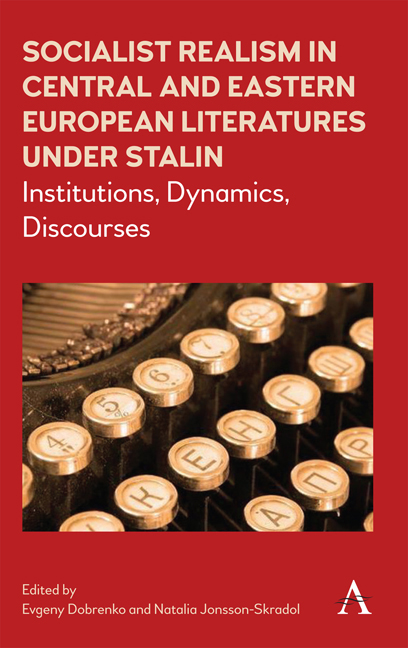 Socialist Realism in Central and Eastern European Literatures under Stalin
Socialist Realism in Central and Eastern European Literatures under Stalin Conclusion
Published online by Cambridge University Press: 10 May 2018
Summary
Hannah Arendt remarked that one of the paradoxes inherent in totalitarian states is that, on the one hand, their professed veneration of transformations induces in them a deep- seated fear of stability and permanence, but on the other hand, for these regimes to function, their institutions require a certain degree of predictability and continuity. The Soviet experience, reproduced in different versions multiple times beyond the borders of the country, is a testimony to the truth of this statement. At the same time, it also points to yet another aporia at the heart of the great political and cultural experiment. As the chapters in Part 1 of this volume show, the very idea of an ‘institution’ in the context of regimes- in- the- making was rather vague, encompassing entities as diverse as overregulated Soviet bureaucratic machines and (allegedly) informal groups of writers and intellectuals. The most minute changes on the local political scene or in Moscow, settlements of accounts and fractional interests of groups motivated by principles that were not necessarily immediately clear to anyone not directly involved in the process, whatever their intentions – all of these influenced the procedures that are traditionally associated with institutional governance. Affiliations with a certain school of thought or membership in an artists’ union, academic congresses debating on the precise definitions of key concepts such as ‘socialism’, ‘realism’ and ‘tradition’, debates on one's private experience as a writer in the new society and on the place of a particular figure in the artistic canon – all these had a bearing on the politics in the respective countries, at least as much as the decisions made at top Party meetings and political summits. Whether or not ‘socialism’ was taken as a synonym of ‘Soviet power’, whether or not ‘realism’ equalled ‘socialist realism’ and whether or not ‘national tradition’ was to be regarded as a natural precursor of proletarian writing, all of these issues had repercussions for institutional policy in the respective countries as well as in Moscow. The case studies discussed in Part 1 show why any clear- cut approach to an analysis of these events, regardless of whether it privileges a top- down or a bottom- up model, is inevitably limiting and misses important elements in the multi- storeyed edifice of Soviet cultural internationalism.
- Type
- Chapter
- Information
- Socialist Realism in Central and Eastern European Literatures under StalinInstitutions, Dynamics, Discourses, pp. 343 - 348Publisher: Anthem PressPrint publication year: 2018


